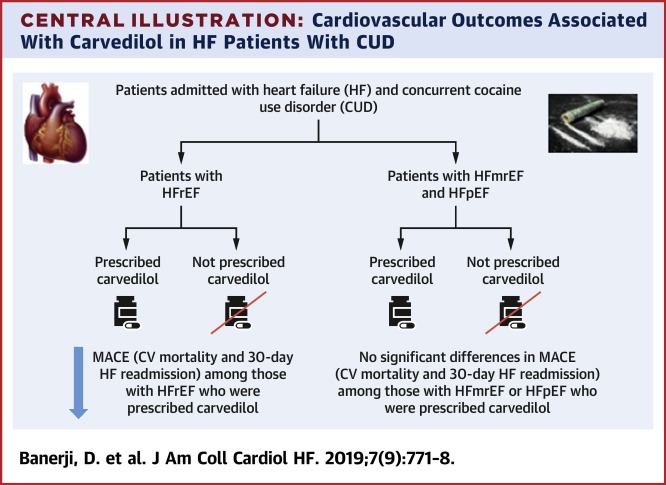JACC: Heart Failure ( IF 13.0 ) Pub Date : 2019-08-26 , DOI: 10.1016/j.jchf.2019.06.010 Dahlia Banerji 1 , Raza M Alvi 2 , Maryam Afshar 3 , Noor Tariq 4 , Adam Rokicki 5 , Connor P Mulligan 1 , Lili Zhang 1 , Malek O Hassan 1 , Magid Awadalla 1 , John D Groarke 6 , Tomas G Neilan 5

|
Objectives
This study sought to assess the safety of carvedilol therapy among heart failure (HF) patients with a cocaine-use disorder (CUD).
Background
Although carvedilol therapy is recommended among certain patients with HF, the safety and efficacy of carvedilol among HF patients with a CUD is unknown.
Methods
This was a single-center study of hospitalized patients with HF. Cocaine use was self-reported or defined as having a positive urine toxicology. Patients were divided by carvedilol prescription. Subgroup analyses were performed by strata of ejection fraction (EF) ≤40%, 41% to 49%, or ≥50%. Major adverse cardiovascular events (MACE) were defined as cardiovascular mortality and 30-day HF readmission.
Results
From a cohort of 2,578 patients hospitalized with HF in 2011, 503 patients with a CUD were identified, among whom 404 (80%) were prescribed carvedilol, and 99 (20%) were not. Both groups had similar characteristics; however, those prescribed carvedilol had a lower LVEF, heart rate, and N-terminal pro–B-type natriuretic peptide concentrations at admission and on discharge, and more coronary artery disease. Over a median follow-up of 19 months, there were 169 MACEs. The MACE rates were similar between the carvedilol and the non-carvedilol groups (32% vs. 38%, respectively; p = 0.16) and between those with a preserved EF (30% vs. 33%, respectively; p = 0.48) and were lower in patients with a reduced EF taking carvedilol (34% vs. 58%, respectively; p = 0.02). In a multivariate model, carvedilol therapy was associated with lower MACE among patients with HF with a CUD (hazard ratio: 0.67; 95% confidence interval; 0.481 to 0.863).
Conclusions
Our findings suggest that carvedilol therapy is safe for patients with HF with a CUD and may be effective among those with a reduced EF.
中文翻译:

卡维地洛用于可卡因使用障碍的心力衰竭患者。
目标
这项研究旨在评估卡维地洛治疗对可卡因使用障碍(CUD)的心力衰竭(HF)患者的安全性。
背景
尽管在某些心力衰竭患者中推荐使用卡维地洛治疗,但对于有CUD的心力衰竭患者,卡维地洛的安全性和有效性尚不明确。
方法
这是对住院的HF患者的单中心研究。可卡因的使用是自我报告的或定义为尿毒理学阳性。患者按卡维地洛处方分开。通过射血分数(EF)≤40%,41%至49%或≥50%的分层进行亚组分析。主要不良心血管事件(MACE)定义为心血管疾病死亡率和30天HF再入院。
结果
在2011年的2578例心力衰竭住院患者中,发现503例CUD患者,其中404(80%)处方卡维地洛,而99例(20%)则未使用卡维地洛。两组具有相似的特征。然而,那些处方卡维地洛在入院和出院时具有较低的LVEF,心律和N端pro-B型利钠肽浓度,并且冠心病的发生率更高。在19个月的中位随访中,有169例MACE。卡维地洛组和非卡维地洛组之间的MACE发生率相似(分别为32%和38%; p = 0.16)以及EF保留组之间的MACE发生率(分别为30%和33%; p = 0.48)和EF降低的患者服用卡维地洛的比例较低(分别为34%和58%; p = 0.02)。在多元模型中,
结论
我们的研究结果表明卡维地洛治疗对于伴有CUD的HF患者是安全的,并且在EF降低的患者中可能是有效的。



























 京公网安备 11010802027423号
京公网安备 11010802027423号